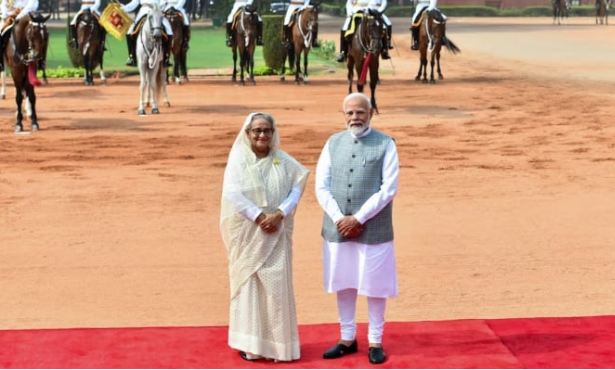DHAKA, NOV 17: Bangladesh on Monday demanded India extradite ousted former prime minister Sheikh Hasina, hours after she was sentenced to hang for crimes against humanity.
On Monday a court in Dhaka sentenced Hasina as well as former interior minister Asaduzzaman Khan Kamal to death in absentia, after being found guilty of crimes against humanity over a deadly crackdown against last year’s student-led uprising.
The former minister’s whereabouts are not known, but Bangladesh says he is also in India.
“We urge the government of India to immediately extradite the two convicts to the Bangladeshi authorities,” Dhaka’s foreign ministry said in a statement, saying it was “an obligatory responsibility for India”.
Bangladesh warned that “granting asylum to these convicts… would be extremely unfriendly and an affront to justice.”
India’s foreign ministry said that it had “noted the verdict” of Hasina.
“India remains committed to the best interests of the people of Bangladesh, including in peace, democracy, inclusion and stability,” the ministry said in a statement that does not directly address the issue of potential extradition.
Hasina’s 15-year tenure saw widespread human rights abuses, including the mass detention and extrajudicial killings of her political opponents.
Bangladesh last year said it would request an Interpol red notice for Hasina, but there was no record on the global police body alert law enforcement list.
Bangladesh’s interim leader Muhammad Yunus welcomed the verdict.
“The awarding of death sentences to Sheikh Hasina and Asaduzzaman Khan Kamal in the crimes against humanity case is a historic verdict,” the Nobel Peace Prize winner said in a statement.
He called for calm and warned against any “attempt to violate public order”, urging “everyone to refrain from any indisciplined acts”.
Hasina’s son and adviser, Sajeeb Wazed, told Reuters on the eve of the verdict that they would not appeal unless a democratically elected government took office with the Awami League’s participation.
During the trial, prosecutors told the court that they had uncovered evidence of her direct command to use lethal force to suppress a student-led uprising in July and August 2024.
According to a United Nations report, up to 1,400 people may have been killed during the protests between July 15 and August 5, 2024, with thousands more injured — most of them by gunfire from security forces
Hasina was represented by a state-appointed defence counsel who told the court that the charges against her were baseless and pleaded for her acquittal.
Ahead of the verdict, Hasina dismissed the accusations and the fairness of the Tribunal proceedings, asserting a guilty verdict was “a foregone conclusion.”
Bangladesh has been tense ahead of the verdict, with at least 30 crude bomb explosions and 26 vehicles torched across the country over the past few days. There have been no casualties, however.
‘Politically motivated’
Hasina, 78, who has remained in India since she was overthrown in August 2024, challenged the legitimacy of the Tribunal in an email interview with Reuters last month.
“These proceedings are a politically motivated charade,” she said. “They have been brought by kangaroo courts, with guilty verdicts a foregone conclusion. They are presided over by an unelected government which consists of my political opponents.”
She also said she was denied adequate notice of the hearings and any meaningful opportunity to mount a defence, adding that she was not personally involved in the use of lethal force or other alleged crimes.
The Muslim-majority South Asian country of 170 million people has been governed by an interim administration headed by Nobel Peace laureate Muhammad Yunus since Hasina fled. Although the country has been largely peaceful since, political stability is yet to return.
In the Reuters interview, Hasina warned of growing anger among supporters of the Awami League and said that millions of party loyalists would boycott the parliamentary elections in February.
On Monday, security remained tight across Dhaka and other major cities, with paramilitary forces deployed around key government buildings and the tribunal complex.
Authorities said they were prepared for any trouble after the verdict.

















